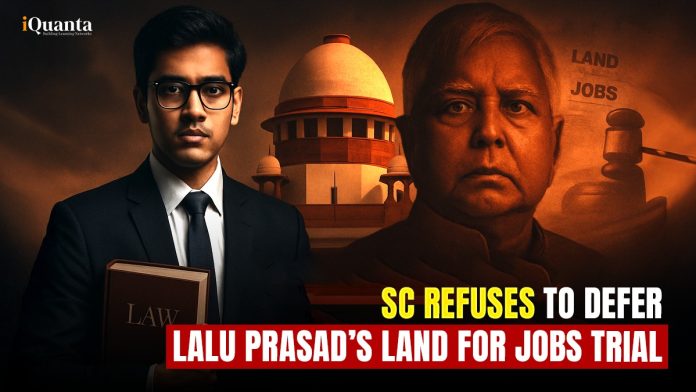On 30th July, 2025 RJD (Rashtriya Janata Dal) supreme Lalu Prasad Yadav’s filed a legal petition regarding land for jobs trial. The plea demanded to postpone the trial court proceedings in the alleged land for jobs scam case till 12th August 2025. He insisted upon this date as it marks the scheduled hearing before the Delhi High Court for his petition to quash the Central Bureau of Investigation (CBI) case against him.
The immediate consequence of this ruling is that the trial in the land-for-jobs scam will proceed towards the framing of charges against Lalu Prasad and other accused, including his wife Rabri Devi and son Tejashwi Yadav. Delhi High Court’s has scheduled hearing on August 12, where Lalu Prasad’s petition to quash the FIR will be thoroughly examined.
Important Timelines in the Land-for-Jobs Scam
| Event | Date or Period |
| Period of Alleged Offence (Lalu’s tenure as Railway Minister) | 2004-2009 |
| CBI FIR Registered | 18th May, 2022 |
| Delhi High Court Refuses Stay on Trial | 29th May, 2025 |
| Lalu Moves Supreme Court for Stay | 17th July, 2025 |
| Supreme Court Refuses to Stay Trial (First Instance) | 18th July, 2025 |
| Supreme Court Refuses to Defer Trial (Latest Ruling) | 30th July, 2025 |
| Delhi High Court Hearing on Quashing Plea | 12th August, 2025 |
| Current Trial Status | CBI concluded arguments on framing of charges |
The Land-for-Jobs Scam: A Comprehensive Background
Origins and Allegations
The land-for-jobs scam originated in the period between 2004 and 2009, during which Lalu Prasad Yadav served as the Union Minister for Railways. The Central Bureau of Investigation (CBI) formally registered the case on 18th May, 2022, initiating an investigation into what it alleges was a criminal conspiracy. RJD Lalu Yadav had to serve jail and other legal troubles. However, the court has agreed to investigate the full matter and also focus on the constitutional and evidentiary grounds raised in Yadav’s petition.
Mr. Prasad, who was then the Railway Minister, leveraged his office to secure pecuniary advantages. These advantages allegedly materialized in the form of land parcels, which were transferred into the names of his family members or close associates.
In exchange for these land transfers, the CBI determined that Group ‘D’ appointments were made in various zones of the Indian Railways. A particular focus is on appointments within the West Central Zone, headquartered in Jabalpur, Madhya Pradesh. The investigating agency then highlighted that no public advertisement or notice was issued for these appointments, a significant deviation from standard recruitment procedures. Furthermore, many of the appointees, despite being residents of Patna, were reportedly placed in railway zones located across distant cities such as Mumbai, Jabalpur, Kolkata, Jaipur, and Hajipur.
The CBI case was registered against several individuals, including Lalu Prasad Yadav himself, his wife Rabri Devi, alongwith his two daughters. Other unidentified public officials and private persons were also involved.
The Central Bureau of Investigation (CBI) serves as the primary investigative agency responsible for probing the land-for-jobs scam. The agency has diligently pursued the case, and filed multiple chargesheets in 2022, 2023, and 2024 consecutively. As per CBI, Lalu Yadav had influenced two officers of central Railways as the railway minister and appointed the owners and other family members of the land parcels where he was having interest.
CBI also added that three land parcels were transferred to Lalu and his family either by the candidates or family members who wanted jobs.
Overview on the Upcoming Delhi High Court Hearing (August 12)
The Delhi High Court’s hearing on August 12, 2025, concerning Lalu Prasad’s petition to quash the CBI FIR, represents the next important step. The High Court’s decision on the applicability of Section 17A of the PC Act will be of paramount importance. If the FIR is indeed quashed on this procedural ground, it would constitute a major legal victory for Lalu Prasad, potentially dismantling the entire case against him. However, if the High Court rejects his request, the trial court will proceed with the framing of charges, moving the case closer to a full trial on its merits.
As the trial court proceeds towards the critical stage of framing charges, and the Delhi High Court prepares to hear the pivotal quashing petition on August 12, the legal and political landscape surrounding Lalu Prasad Yadav remains highly dynamic. The ultimate outcome of these proceedings will not only determine his individual legal fate but will also have broader implications for anti-corruption jurisprudence in India and the evolving political narrative within Bihar and across the nation. The judiciary’s steadfast role in upholding due process while simultaneously ensuring accountability remains a cornerstone of India’s democratic framework.
Law of Speedy Trial as Applied in India
The Article 21 of the constitution of India mentions the rights of the people to have basic rights of life and liberty. Over the time Supreme Court has interpreted this article to also mean the right to speedy trial. It mentions unnecessary delay of trial leads to deprivation of the liberty of an individual. Supreme court also added that an individual must not have to go through the pressure and difficulty of prolonged law procedure. Therefore, the court judgment that denied the Lalu Yadav’s philosophy of the court demonstrates that the court is not joking when it comes to deny criminals the opportunities to extend a trial by employing legal methods.
FAQs
Q1. What is the land for jobs case?
During the years 2004 to 2009 Lalu Yadav had taken advantages in the form of transfer of land property in the name of his family members and appointed group D posts in different zones of the railways. The candidates were appointed within three days of applying by the railway officials.
Q2. Why Supreme Court’s decision is important in this case?
The supreme court’s decision is important as it strengthens the right to speedy justice, protects the independence of judiciary, etc.
Join CLAT Course Now!






